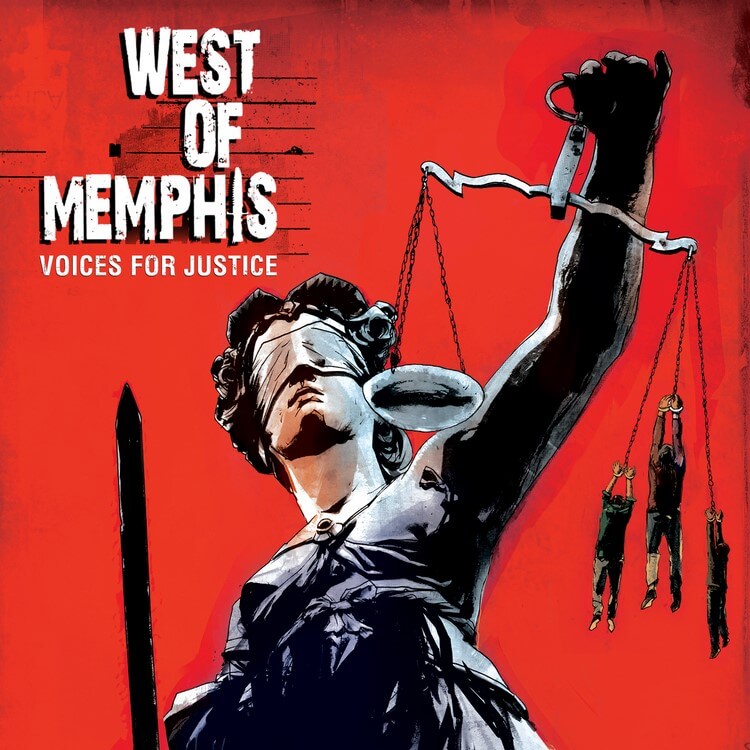West of Memphis is the most peculiar of films - it's a movie which warns of the dangers of witch-hunts whilst trying to inspire one of it's own. It's also perhaps the first time in cinema history that an alleged child murderer has produced a documentary about themselves with the aid of an Academy Award winning film-maker. I also, try as I may, struggle to recall any other movie which uses the imagery of vicious turtles devouring a dead pig's penis as a way of disproving allegations of satanic rituals in small town America.
The film's genesis is found in 1993 with the murder of three young children; their mutilated corpses, found hog-tied, inspired revulsion, disgust and a thirst for revenge amongst a townsfolk who had been whipped up into a moral panic about Satan worshipers by zealous, sensationalist policemen investigating the crime. The three culprits who, according to detectives, best fit the bill as having the potential to sacrifice young children as part of an occultist ritual were a trio of local rock fans - Damien Echols, Jason Baldwin and Jessie Miskelley. The prosecution's evidence was a combination of largely circumstantial and plainly prejudiced, a liking for Metallica was cited as one reason the men should be convicted, but struck a chord with the jury who found each of the three guilty, rewarding a death sentence to Echols.
Whilst on Death Row, the story of the perceived miscarriage of justice found an audience due to HBO's Paradise Lost documentary and a cause celebre was instantly born. The likes of Pearl Jam, Henry Rollins, Johnny Depp and Peter Jackson (who produces this film alongside Echols) soon found themselves involved in campaigns to free the West Memphis Three and awareness of the case grew around the world. (Many of the individuals who did great work on researching the crime is omitted from the documentary if these people did not fit the celebrity criteria: Jason Baldwin's indefatigable lawyers' years of hard work, for example, is eschewed in favour of vacuous sound bites from public figures.)
One problem, however, arose: If Echols, a young man suffering from an array of mental illnesses and delusions at the time of the attack, and his friends were not responsible for the slaughters then who else could be? If the West Memphis Three were innocent, a guilty party must still be on the loose - something which has caused many problems for alternative theory advocates.
West of Memphis spends the majority of it's running time making certain it's audience realises that the three convicted men were victims of gross injustices inflicted by a modern day witch hunt. Yet, alarmingly and rather dangerously, the film decides to pursue an inadvisable avenue and publicly declare that a man who has not been pressed with any charges may well be guilty of the crime. Astoundingly, this is not the first time Echols has done this. During the sequel to Paradise Lost , the film-makers Joe Berlinger and Bruce Sinofsky strongly imply that John Mark Byers may have been responsible for the murder of his own son. Conjecture was assumed as fact by many and Echols jumped on the band-wagon, accusing Byers of the atrocity before later rescinding his allegations. The truth, it seems, is that Byers may not have been responsible after all.
Paradise Lost 3 (which received an Oscar nomination) shows that perhaps none of the previous four suspects were responsible; Terry Hobbs, the step-father of another child, has emerged as a prime suspect for the brutal slayings. One of Hobbs' hairs was found in his step-son's shoelace and a rich amount of gossip from those close to his family suggest he could be guilty; no more proof is needed in the eyes of Echols, Jackson and West of Memphis' director Amy J. Berg - their feature goes to great lengths to persuade of Hobbs' guilt. It's a peculiar and hypocritical approach for Echols and his collaborators to rely entirely on conjecture to accuse and, as I've written before , gossip and hearsay do not make a solid substitute for facts. In this case the whole thing is damn irresponsible.
West of Memphis is a film which illustrates how witch hunts work and how destructive they can be. Sadly, it is not just the community who sent Echols' to death which committed this offence. Echols himself has gone from hunted to hunter and this feature leaves a nasty taste in the mouth as a cross between a public relations stunt and a piece of "he said, she said" tittle tattle. There's a fascinating story to be told surrounding this case, of which an incredible amount of people will come out looking rather poorly. The prejudiced finger-pointing here is no worse than the assumptions which resulted in the initial convictions and that is an embarrassing shame. The great tragedy, aside from the loss of three young children's lives, is that no lessons seem to have been learnt. Hobbs may well be guilty but many of the same accusers here were thoroughly convinced of Byers' guilt too and were not afraid to convict him publicly either. If we don't learn from the past, we're doomed to make the same mistakes over and over.
You can find out more about West of Memphis
here


No comments
Post a Comment